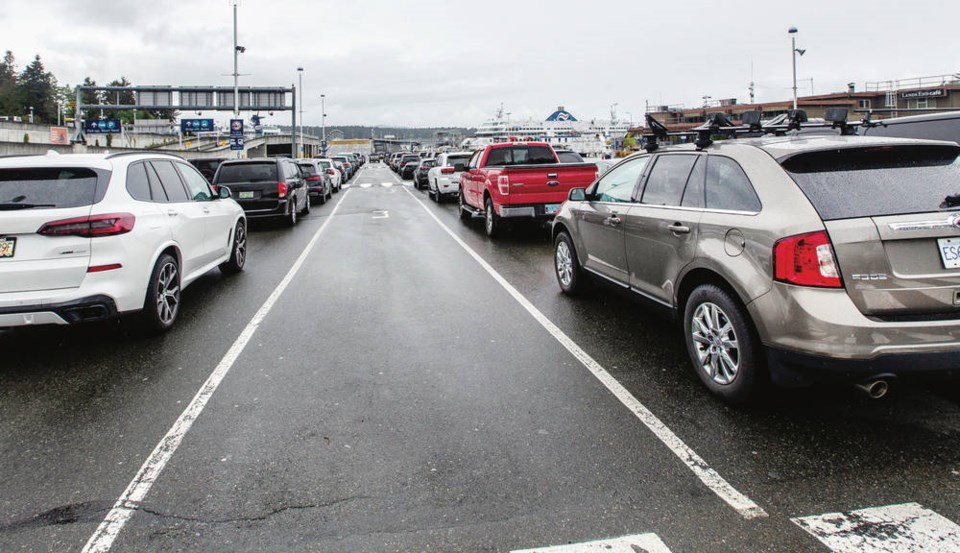Traffic was a little lighter, but there were still plenty of travellers at Swartz Bay ferry terminal on Saturday as new COVID-related travel restrictions kicked in.
Until May 25, only essential travel is sanctioned between B.C.’s health regions. That includes things such as transporting commercial goods, going to work or school, or accessing health care.
Just before the 1 p.m. sailing, 56 per cent of vehicle space remained on the Swartz Bay to Tsawwassen run. On a pre-pandemic spring weekend afternoon sailing, remaining vehicle space would typically be down to the 10 to 30 per cent range.
Travellers waiting for the 3 p.m. ferry from Swartz Bay included people returning home from work meetings or other professional duties. One worker from a medical-device company was taking a final trip before locking down.
Artur Willman was in line because he was moving from Victoria to Whistler.
“I gotta get there,” he said. “I gotta move my stuff.”
Willman said he can accept the new restrictions.
“It’s needed to keep the numbers down and get things back to normal.”
Scott Gailey lives in Vancouver but regularly goes back-and-forth on the ferry for his job in forestry research.
He said using police roadblocks to check on adherence to regulations could be a difficult task to carry out, and also wondered what effect the regulations were having on ferry travel — since the Swartz Bay terminal had three solid lines of traffic lined up and waiting.
B.C. Ferries ticket staff is asking customers about whether their travel is essential and accepting their word.
Destination Greater Victoria chief executive Paul Nursey said there has been a joint effort involving the tourism sector in developing the current course of action to reduce the spread of COVID-19.
“I want to stress that we were engaged for the last 10 days or so by government, which is the most engaged we’ve been since the outset of the pandemic and that’s very positive,” Nursey said.
“While there’s a lot of frustration, of course, for the whole situation, everyone’s supportive of doing what we need to do now so we can get through this as quickly as possible, and get to the other side.
“So that’s the spirit.”
The industry is hoping things being done now will lead to a more open summer, he said.
Beyond that, the tourism organization would like to work with government on a plan for re-opening visitor markets in other parts of B.C., in Canada, and beyond.
“For now we just have to get through this health period and get more people vaccinated.”
Nursey said it has obviously been tough for tourism during the pandemic.
“Bumping along half-open, half-closed hasn’t really been working for the last year,” he said. “So I think we want to take definitive action now.”
The industry is “resolute” in what is happening, Nursey said. “This is what we have to do.”
Advice coming from the Ministry of Environment is for people to camp and pursue outdoor activities “as close to home as possible.”
“B.C. Parks is communicating directly with reservation holders who may need to cancel reservations to receive a full refund,” the ministry said in a statement.
Local hotels are adding updated messages on their websites in light of the travel rules, with specific reference to their April 23 enactment.
“We look forward to welcoming you when the time is right,” the Magnolia Hotel site said, while the Accent Inns site assured people travelling to its locations for essential reasons that they will feel safe there.



